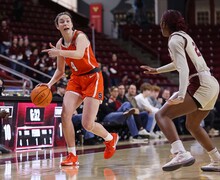SU looks to expand faculty hiring program
William Mooney | Contributing Illustrator
Syracuse University is in its second round of a campus-wide hiring initiative to increase collaboration between faculty and support research at the university.
The university approved a total of 53 hires across seven academic and research areas as part of its Cluster Hires Initiative in November 2018. Faculty hired are put into clusters, which are multidisciplinary groups that combine people with similar research interests.
Now, SU is looking to expand the initiative. Three more clusters have been proposed, bringing the total to 10 if approved, and the university will also add to the faculty hired through the initiative.
“At this point we are asking our faculty, working with their chairs, (assistant deans of research) and deans to propose positions,” said John Liu, vice president for research, at a Monday information session on the initiatives.
Chancellor Kent Syverud announced a plan in February 2019 to hire 200 faculty over the course of five years through the Cluster Hires Initiative and the Signature Hires Initiative. The amount of hires between both initiatives will change as clusters and positions are proposed, said Christina Leigh Docteur, director of proposal support services, in an email.
Thirty-three hires were approved in May 2018 as part of the Signature Hires Initiative, a push to find individual faculty in specific research fields. As of Tuesday, 25 signature hires have been completed and eight are in the process of being filled. Fourteen cluster hires have been completed.
One cluster currently in the process of hiring is the BioInspired Syracuse: Institute for Material and Living Systems, an expansion of SU’s Syracuse Biomaterials Institute. It will employ 13 people from the cluster hires initiative.
The purpose of the institute is “to perform cutting edge world class research that has a real impact on society both in materials design and then health and medicine,” said Lisa Manning, BioInspired Syracuse’s founding director. The institute was conceptualized last January, and the hiring process began in March.

Karleigh Merritt-Henry | Digital Design Editor
Dacheng Ren, associate director of BioInspired Syracuse, estimated that the hiring process will be completed in the next two years. Three of the 13 positions have been filled, Ren said.
The institute is bringing together faculty from all around campus, including physics, biology and chemistry faculty from the College of Arts and Sciences and biomedical, chemical, mechanical and aerospace engineering faculty from the College of Engineering and Computer Science.
“The thing that is most exciting is that the faculty are already starting to work together across departments and even across colleges in new ways,” Manning said. “And to me, that means that students will have the opportunity to work with multiple faculty on projects that aren’t bounded by departments.”
Another institute on campus looking to gain an expanded, more interdisciplinary faculty through the cluster hiring process is the Aging Studies Institute — part of the aging, behavioral health and neuroscience cluster. SU approved nine hires for the cluster, and five of them are intended to be affiliated with the institute.
The ASI conducts interdisciplinary research, pulling faculty from both the Maxwell School of Citizenship and Public Affairs and David B. Falk College of Sport and Human Dynamics to study aging related issues at SU. In its cluster hires, the institute is looking to “build bridges” and support “multidisciplinary collaboration,” said Janet Wilmoth, director of the ASI and cluster hire representative in the institute’s search committee.
She said she hopes the interdisciplinary push will help students expand their understanding of how to collaborate and work in teams. By engaging faculty from multiple backgrounds, the institute’s research abilities will increase and expand into the student’s education, Wilmoth said.
“I also think that it is about the students,” she said. “It’s not just about the research it is about, you know, trying to get the best scholars on campus and doing that is going to benefit the students, too.”
In addition to the new position proposals, Liu spoke about three more cluster proposals at Monday’s information session — quantum information science and cryptography, citizenship and democratic institutions and digital and immersive praxes. The new clusters need to be approved, but hiring proposals can still include positions in them.
The clusters, both the seven approved and three proposed, are multipurpose, Liu said. They have four main intentions: aligning hires with research and funding trends; promoting interdisciplinary collaboration; allowing studies to address social problems and improving education by hiring scholar educators, he said.
I think there's a recognition that there's an increasing number of topics and problems that really span across disciplines and that having interchange between people from different disciplines is very valuable.Kevin Crowston, associate dean for research in the School of Information Studies
Part of the idea behind the clusters is bringing together strengths, said Kevin Crowston, associate dean for research in the School of Information Studies. Collaborating is difficult in most universities because people are in different schools or departments, meaning they may not have many opportunities to interact with each other, he said.
In the iSchool, three positions are being hired in two clusters, said Crowston, who also chairs the search committee for the iSchool hires. There will be two in the cluster on artificial intelligence, deep learning, and autonomous systems and policy — which includes SU’s Autonomous Systems Policy Institute, launched in May.
The other hire will be in the innovation and entrepreneurship cluster. The University Libraries are also part of that cluster with one position being hired for, said Scott Warren, associate dean for research excellence. The cluster is building on a “campus-wide ecosystem” and will study in part the effects of participating in systems of innovation and entrepreneurship on student outcomes, he said.
“There’s a recognition that there’s an increasing number of topics and problems that really span across disciplines and that having interchange between people from different disciplines is very valuable,” Crowston said.
The deadline for the next round of position proposals is Nov. 1, after which the submissions will go through a series of reviews and evaluations. As part of the approval process, the proposals will have to be greenlighted by the Provost Review Panel.
Eleven people sit on the panel, including Liu and Vice Chancellor for Strategic Initiatives and Innovation Mike Haynie. Provost Michele Wheatly and Chancellor Syverud have the final approval of cluster hires.
The second round of proposals should be approved by the end of February 2020. Fall 2021 is the earliest start date for approved positions.
Published on October 2, 2019 at 12:23 am
Contact India: irmiragl@syr.edu





